By PJ Parrish
I’ve begun my annual Edgar banquet chairman duties. I enjoy this a lot because it forces me to pay close attention to some of the best writing our genre has to offer. This year, as in the past, I thought I’d share the openings of the six nominees for Best Novel. Some really seasoned vets in the mix and a couple you might not know. I tried to break the excerpts off at logical places to give each writer enough time to find their narrative legs. All typos are mine, by the way. I had to hand-enter these. Curse you, Amazon…
Let’s take a look at how they have chosen to open their stories. My comments follow each excerpt.
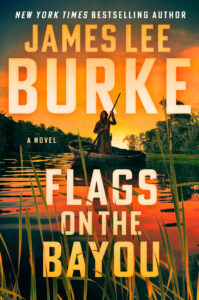
Flags On The Bayou. By James Lee Burke.
Morning on the Lady of the Lake Plantation can be grand experience, particularly in the late fall when the sky is a clear blue, and the wind is blowing in the swamp, Spanish moss lifting in the trees, and thousands of ducks quacking as they end their long journey to the South. However, in this era of trouble and woe it is difficult to hold on to these poignant moments, as was the case last evening when our Christian invaders from the North lit up the sky with airbursts that disintegrated into curds of yellow smoke and descended on the grass and swamp in configurations that resembled spider legs.
A twisted piece of hot metal landed no more than ten feet from the chair in which I sat and the artist’s easel on which I painted, but I did not go inside the house. I would like to tell you that I am brave and inured to the damage cannon fire can wreck on the bodies of both human beings and animals. But that is not the case. There’s a Minie still parked in my left leg and I need no convincing of the damage Billy Yank can do when he gets up his quills. The truth is I both fear the wrath of our enemies, as I fear the wrath of God, and at the same time wish that I could burn inside its flame and be cleansed of the guilt that I never thought would be mine,
______________________
Well, you know you’re in Burke-landia from the get-go, right? This is a writer renowned for his lyricism, and we are firmly in the narrator’s point of view here. I admire, as always, Burke’s descriptive power. I love the image of “curds” of yellow smoke, and I am a sucker for a vivid sense of place. But such a leisurely build is not everyone’s cup of tea, including mine. The pace is slow and deliberate, thanks to the long paragraphs and phrasing. I do like the way Burke gently reveals details about his narrator — he’s a wounded vet who now finds peace in painting. And that last subtle line is terrific — he needs to be free of a guilt that he might feel is not rightly his. That last line would make me set aside impatience and read on. How about you?
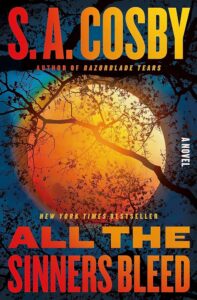
All The Sinners Bleed by S.A. Cosby
Charon County was founded in bloodshed and darkness.
Literally and figuratively.
Even the name is enveloped in shadows and morbidity. Legend has it the name of the county was supposed to be Charlotte or Charles County, but the town elders waited too late and those names were already taken by the time they decided to incorporate their fledging encampment. As the story goes, they just moved their fingers down the list until they settled on Charon. Those men, weathered as whitleather with hands like splitting mauls, bestowed the name on their new town with no regard to its macabre nature. Or perhaps they just like the name because a river flowed through the county and emptied into the Chesapeake like the River Styx.
Who knows? Who could know the thoughts of these long-dead men.
What is known is that 1805 in the dead of night a group of white landowners, chafing at the limits of their own manifest destiny, set fire to the last remaining indigenous village on the teardrop-shaped peninsula that would become Charon County.
___________________________________
Another slow, measured opening that, like Burke’s, centers around the sense of place. Cosby has chosen to establish Charon County as a character, including an overt mythological reference to Charon, the ferryman who carried souls over the river Styx that separated life and death. Nice, that. Sort of forebodding. We don’t get a clear sense of who is narrating here. I suspect, unlike Burke’s, it’s omniscient. I like the pacing: The opening graph is long but relief comes with the break “Who know?…” Then we get the kicker graph that tells a village and its people was brutally wiped off the earth. A couple fine images here, including “weathered as whitleather.” Had to look that up: Whitleathering is a special tanning process that keeps leather white. I would definitely read on.
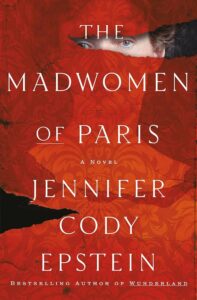
The Madwomen Of Paris by Jennfier Cody Epstein
I didn’t see her the day she came to the asylum.
Looking back, this sometimes strikes me as unlikely. Impossible, even, given how utterly her arrival would upend the already chaotic order of things at the Salpetriere — not to mention change the course of my own life there. At times I even forget I wasn’t present at that pivotal moment, for I can see it so clearly in my mind’s eye: The bloodstreaked clothing and skin. The wild eyes and unnkempt hair. The slim legs, bare of stockings, covered with bruises and mud. That single bare foot — for she had lost her boot at some point — as white and fragile as an unshelled egg. My mind replays her screams as the orderlies drag her from the ambulance, an otherworldly mix of falcon and banshee interspered with strangled pleas: nonono, don’t TOUCH me and I will kill myself and — most chilling of all: They are coming. Do you hear me? THEY ARE COMING! I marvel at the sheer physical strength I saw — or think I saw — her displaying, at the way she fought so viciously against the men attempting to drag her into the administration building that they had to briefly lay her down to attend to a wrist she had bitten, a cheek she had scratched, a kick she had successfully landed to a loathsome man’s privates…It’s all etched into my head with such clarity that, more than once, I’ve consulted the journal I kept at the time, scanning through its scribbled pages to affirm that these “memories” are, in fact, not memories at all. That rather, they are imaginative reconstructions, woven together from various medical reports and doctors’ musing, and from snippets gleaned from those who did witness her arrival — or else were party to it, and bore the injuries to prove it.
_____________________________
Do you notice a pattern here? We seem to be getting all slow-build, contemplative narrations. No action to be found. I found all six entries to be of the same nature. With Epstein’s, I am a little put off by the dense second paragraph. When I read it cold the first time, I didn’t care for it at all. By having to retype it for this post, I was forced to slow down and consider it more carefully. I love the opening line and the fact the writer chose to set it off by itself. But that big chunky second graph is a lot to chew on. Lots of descriptive memories embedded. Too many? What do you all think? Again, like Burke’s opening, we are locked into the narrator’s memories. Everything is in the past. I’m guessing Epstein is using an unreliable narrator here — she’s in an asylum, says she never saw the patient, and even admits her “memories” might be false. Intriguing, if a bit turgid for my taste. Not a fan of all those colons, elipses and dashes. And I found some points repetitious, especially her telling us several times she actually witnessed nothing.
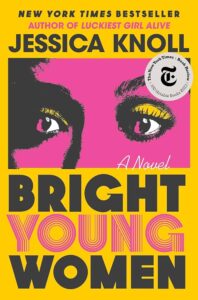
Bright Young Women by Jessica Knoll
You may not remember me, but I have never forgotten you, begins the letter written in the kind of cursive they don’t teach in schools anymore. I read the sentence twice in stinging astonishment. It’s been forty-three years since my brush with the man even the most reputable papers called the All-American Sex Killer, and my name has long since fallen to a footnote in the story.
I’d given the return address only a cursory glance before sliding a nail beneath the envelope’s gummed seam, but now I hold it at arm’s length and say the sender’s name out loud, emphatically, as thought I’ve been asked to answer the same question twice by someone who definitely heard me the first time. The letter writer is wrong. I have never forgotten her, either, though she is welded to a memory that I’ve often wished I could.
_________________________
I like this opening best. Yes, we are in narrator’s memories AGAIN. But Knoll keeps things tight and moving along, taking us quickly back to the present with the image of holding the letter at arm’s length. There’s a lot of good tension building here. We know immediately we’re dealing with a serial killer. We know the narrator has a relationship to her. We know it’s haunting her. Tight and tense. Well done, I say.
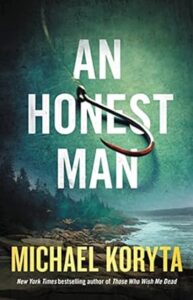
An Honest Man by Michael Koryta
The yacht appeared nine weeks after Israel returned to his father’s house, and even from a distance and under the squeezed red sun of dawn, he could see that the vessel was in trouble. Adrift, rudderless, a possession of the sea rather than a partner of it.
Like anyone who’d grown up on an island off the coast of Maine, he’d seen boats drift before — five of them he would later recall for investigators — and in four of those circumstances, the boats had been empty. In the fifth, a child had been aboard, alone after cutting the lines at a dock and letting the tide take him. The boy’s goal had been to teach his parents a lesson and Israel supposed he’d succeeded, because the boat was in the rocks before they got to it.
So five times he had watched the meandering, listless behavior of a boat without a human hand to direct it, that drunkard’s drift, and five times no one had been hurt. The sixth time would be different.
Why? What was so different about this one? the investigators would ask.
____________________________
Again, we are getting another slow build, the storytelling unfolding through a narrator’s memories. Must be a trend. The action has ALREADY HAPPENED and thing are now in the hands of investigators. Given that I had read the similar approaches of the other nominees, I was longing for an active opening by this point. But I like this opening. It creates tension via the idea that Israel (the narrator) has seen many “drunkard drift” boats before (nice line, that) — but there’s something really hinky with this sixth boat.. I’d read on, but I am really longing for some present-time action and less remembrance. Which leads us to…
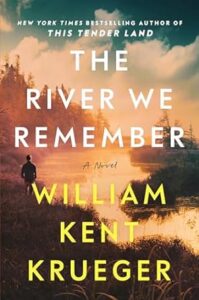
The River We Remember by William Kent Krueger
The Alabaster River cuts diagonally across Black Earth County, Minnesota, a crooked course like a long crack in a china plate. Flowing out of Sioux Lake, it runs seventy miles before crossing the border into Iowa, south of Jewel, the county seat. It’s a lovely river filled with water that’s only slightly silted, making it the color weak tea. Most folks who’ve grown up in Black Earth County have swum in the river, fished it pools, picnicked on its banks. Except in spring, when it’s proned to flooding, they think of it as an old friend. On quiet nights when the moon is full or nearly so and the surface of the Alabaster is mirror-still and glows pure white in the dark bottomland, to stand on the hillside and look down on this river is to fall in love.
With people, we fall in love too easily, it seems, and too easily fall out of love. But with the land it’s different. We abide much. We can pour our sweat and blood, our very hearts into a piece of earth and get nothing but fields of hail-crushed soybean plants or drought-withered cornstalks or fodder for a plague of locusts, and we still love this place enough to die for it. In Black Earth County, people understand these things.
If you visit the Alabaster at sunrise or sunset you’re likely to see the sudden small explosions of water where fish are feeding. Although there are many kinds of fish that make the Alabaster their home, the most aggressive are channel catfish. They’re mudsuckers, bottomfeeders, river vultures, the worst kind of scavengers.Channel cats will eat anything.
This is the story of how they came to eat Jimmy Quinn.
________________________
This is a prologue. Nice and short, thank goodness, because you know how much I dislike them. Krueger, like Burke, is known for his ability to create a memorable sense of place. It’s his hallmark. Again, a slow build, a leisurely fat first graph to tell us where we are — this river is special, Kreuger is stressing, so special you fall under its spell. But then things start to turn darker. The water “explodes” with jumping fish and the worst are the rapacious catfish. And that last line — set off in its own paragraph, please note! — what a good kicker. This opening reminds me of David’s Lynch’s famous opening shot from Blue Velvet: To the accompaniment of Bobby Vinton’s romantic song and chirping birds, the slow-mo camera reveals an ldyllic suburban street with children playing, white picket fences, red roses. A man angrily battles a snake-like garden hose and has a stroke. Then the camera burrows into the grass, the music is replaced by awful gnawing sounds and we get creepy close-ups of devouring beetles. Like that, Krueger sets up a lovely normal then plunges you into cannibal-abnormal. Bill, I didn’t know you had it in you, man.
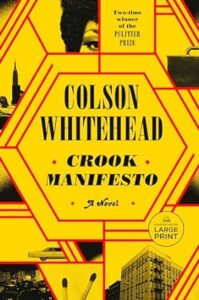
Crook Manifesto by Colson Whitehead.
From then on whenever he heard the song he thought of the death of Munson. It was the Jackson 5 after all who put Ray Carney back in the game following four years on the straight and narrow. The straight and narrow –– it described a philosophy and a territory, a neighborhood with borders and local customs. Sometimes when he crossed Seventh Avenue on the way to work he mumbled the words to himself like a rummy trying not to weave across the sidewalk on the way home from the bars.
Four years of honest and hard work in home furnishings. Carney outfitted newlyweds for their expedition and upgraded living rooms to suit improved circumstances, coached retirees through the array of modern recliner options. It was a grave responsibility. Just last week one of his customers told him that her father had passed away in his sleep “with a smile on his face” while cradling in a Sterling Dreamer purchased at Carney’s Furniture. The man had been a plumber with the city for thirty-five years, she said. His final earthly feeling had been the luxurious caress of that polyurethene core. Carney was glad the man went out satisfied — how tragic your last thought to be “I should have gone with the Naugahyde.” He dealt in assessories. Accent pieces of lifeless spaces. It sounded boring. It was. It was also fortifying, the way that under-seasoned food and watered-down drinks could provide nourishment, if not pleasure.
_________________________
See what I meant about the narrator-memory trend? Must be something in the drinking water this year. I like the cleanliness of Whitehead’s style — no fussy colons and commas, a good mix of long and short sentences. Note that even though both graphs are longish, that long-short mix helps the pacing. The voice feels authentic, weary-wry, and that’s what drew me in here. (I should have gone with the Naugahyde!) I like this guy Carney and I want to know what pushed him off the “straight and narrow.”
Whelp, that’s it, crime dogs. Would love to hear what you all think about these openings. All our lines are open to take your calls.
And just because this is my post and I love this opening so much, here’s Blue Velvet.

Kris, I always enjoy your previews of Edgar nominees. Feels like we’re invited to visit a new candy store before its grand opening to sample the wares. Thanks for this taste.
Of course, the writing is exquisite in all of them. While I like a sense of place, several go on a bit long for my taste. Rather than scenery, I prefer meeting a character to latch onto.
Will be interesting to see who wins.
In the initial round, are books blind submissions?
No, the judging is not blind. But each category panel has rather strict guidelines. I haven’t been involved in it since I was on the national board as Florida chapter prez, so I can’t really say with any authority. I know the rules and such are scrutinized regularly.
Yikes. A decided trend against the kind of opening one would find in classic crime fiction…like…a crime, or a Lead in the middle of some present-moment trouble.
These are, I guess, “up market” attempts, which seems to be the thing right now in traditional publishing. Gives a book a chance for a “long tail” must be the thinking. But most don’t hit that mark.
I like “lyrical” style to be “unobtrustive poetry” marbled into a good action, death-stakes plot.
Thanks for giving your fingers a workout on these, Kris.
“Up market.” Huh…interesting observation, James. I hadn’t considered that but I think you are right. Had to go to Jane Friedman’s blog to get a definition:
“Upmarket fiction is a blend of commercial fiction and literary fiction, but how it gets blended is where writers and industry members can’t always agree. It has universal themes everyone can connect to, with a hyper-focused plot. Universal does not mean meandering and expansive. Universal means ideas that travel. Love, loss, grief, trauma, family secrets, and identity show up in upmarket fiction because these are the books that start hyper-specific, like a dust bowl fiction called The Four Winds, and ends up traveling around the country and the world (selling translation rights as they go).”
So this has now pervaded crime fiction it appears. James, you should do a post on this. Would love to hear your thoughts.
Here’s link to the Friedman post. https://janefriedman.com/what-is-upmarket-fiction/
Very good blog on it here:
“Up market fiction.” Good point, James. I had to go to Jane Friedman’s blog to find a good definition:
“Upmarket fiction is a blend of commercial fiction and literary fiction, but how it gets blended is where writers and industry members can’t always agree.It has universal themes everyone can connect to, with a hyper-focused plot. Universal does not mean meandering and expansive. Universal means ideas that travel. Love, loss, grief, trauma, family secrets, and identity show up in upmarket fiction because these are the books that start hyper-specific, like a dust bowl fiction called The Four Winds, and ends up traveling around the country and the world (selling translation rights as they go).”
Interesting. You should do a post on it, James.
Here’s a link to the post: https://janefriedman.com/what-is-upmarket-fiction/
I need to check the archives here to see if someone has gone into an explanation of “literary fiction”. I’m still confused about what that means. And what does it mean when someone reads an excerpt and says it seems like literary fiction.
It’s all very ambiguous to me.
Unlike most, I like an opening with description. To me it’s the opposite of shopping. I hate shopping, so I zip into the grocery store, fling the stuff I need into my cart, check out and go home. It’s a chore.
When reading, I want to enjoy it. There’s a time and a place for starting abruptly, for sure. But chances are I’m going to pay more attention to a story that grounds me in story world first while still grabbing my attention. I read to escape–so I want to know where I’m escaping to. Is it a place worth escaping to?
For that reason, of these excerpts, the one I’d be most likely to read on would be from the Burke example.
I’m with you BK in that I love an established sense of place. I would probably read on with all these. But yeah, a little judicious editing would be nice.
This was a great read, Kris!
I found these a bit slow, too. But, the descriptions are awesome.
I do like a crime/thriller to open with a crime/thriller scene . . . so . . .
In “The River We Remember”, I’d like the opening to be the last sentence: This is the story of how they came to eat Jimmy Quinn.
Don’t know if that’s a good idea or not, but it’d sure make me turn the page.
Thanks for giving us a peek into these works, Kris. Although I’m not a fan of long descriptive passages, I found myself more engaged with the first-person accounts than the others.
Kudos to the judges. It was hard enough for me to switch gears as I moved through this short list of openings. It must be especially difficult to compare works that are novel length. Do the Edgars judges use written criteria to score each entry?
James Lee Burke has long been one of my favorite authors. I also read everything William Kent Krueger writes. I loved S.A. Crosby’s All the Sinners Bleed and have been catching up on his other books now that I’ve found him. That said, I love them as a writer loves them–for the beautiful narrative, the turn-of-phrase, the character development, and the soaring themes. Solving the crime means less to me than watching the characters navigate and evolve. I like the term up-market fiction, but it also feels like literary fiction to me, but I’m by no means an expert on how these labels apply. As a reader, if I want nail-biting suspense/mystery I look for more “commercial” crime writers. I enjoy both.
Am trying to respond to your comments guys but nothing is showing up. Sorry.
I agree with what others have said about the openings being slow. It’s a cultivated taste I guess, because by the end of your examples, I was liking the slower pace. Went back and reread them and I wouldn’t want to be a judge trying to decide which is best.
Thanks for going to all the trouble. A quick tip: if you download the sample to your e-reader, you can copy the selections you want and paste them in a doc.
I remember being an Edgar judge. Hundreds of books to go through. My supposition is that because judges are expected to read the whole book, these got much better, but I doubt if I’d have continued reading any of them based on the slow “who/what should I care about?” openings.
To be fully honest, I didn’t even finish reading these first pages. Skim territory for me.
Thanks for posting these! I didn’t have time to read them yesterday. My favorite is The Madwoman of Paris. I like the voice and the writing style, and I love an unreliable narrator. All the things you noted that irritated you are what drew me in!
To me, Whitehead’s voice sounds like he’s trying too hard. Also, I recently read a fairly light mystery featuring characters who work in a low-end furniture store (the name is escaping me), and one book on that’s about all I need.
Taste is a funny thing, isn’t it?